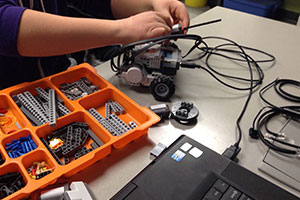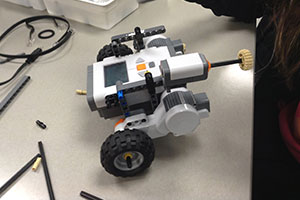Faculty of Education hosts LEGO Robotics workshop for local school
May 1, 2015

Fifteen grade 6 to 8 students from Grove School in Oshawa, Ontario, along with two teachers, recently enjoyed a chance to build and program LEGO NXT robots as part of a workshop hosted by University of Ontario Institute of Technology (UOIT) teacher candidates enrolled in the Intermediate/Senior General Science course.
“The opportunity to build and program robots took the Grove School students into the world of technology that many students do not get a chance to experience,” said Cliff Moon, Instructor, Faculty of Education (FEd). “Many schools do not have access to the robotics kits, as they are fairly expensive. Offering this workshop and our teacher candidates’ expertise to these students was a win-win situation for all involved.”
The elementary students worked with Moon and the teacher candidates to create the robots using LEGO Mindstorms Robotics Kits. Participants spent two hours building the robots. Then, with the guidance of their 12 teacher-candidate mentors, they learned how to program the robots using computers to run autonomous programs including motion, sound and graphics. Each participant also received a Super Scientist Achievement Certificate.
“Cliff’s work moves students beyond simply creating objects for the sake of creating them, to a higher level: critical making,” said Dr. Janette Hughes, Acting Dean, (FEd). “The focus is on the relationship between technologies and social life, with emphasis on the technologies’ potential to liberate and emancipate.”

Grove School students are in a unique situation: they’re unable to attend a community school due to placement in a care, treatment, custody or correctional facility. The school’s primary purpose is to provide students with effective individual instruction that leads to their re-integration into community schools, post-secondary institutions or employment.
FEd has partnered with this group of students and their teachers for two years. Last year, volunteers from the Intermediate/Senior English class worked with the students to examine social justice issues like bullying and challenges facing Indigenous peoples. As part of this project, they generated various types of digital texts and developed important digital literacy skills. This year, the project has focused on engaging the students in the Do-It-Yourself Maker Movement. They have used Makey Makey, an invention kit that turns everyday objects into touchpads that can connect to the Internet; and Arduino kits, which include a programmable circuit board and software, to create simple electronics projects.
Dr. Hughes noted the project ties in closely with her digital literacy-related research. She is looking at how makerspaces - community-operated workspaces where people with common interests can meet, socialize and collaborate – can be used to promote, observe and evaluate the impact of critical building or making. She focuses on using digital tools, including digital text-making, coding, robotics, and e-textiles.



